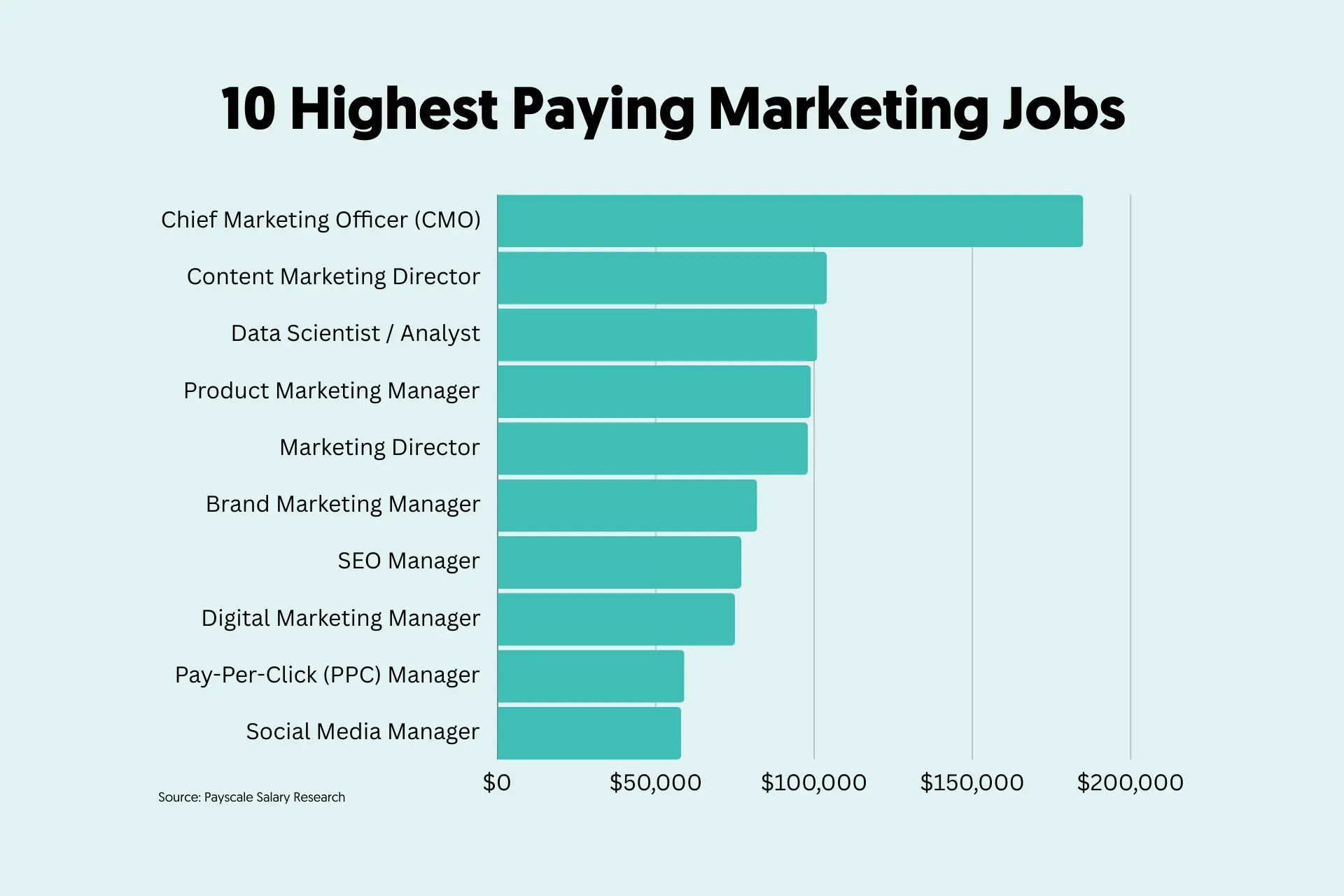- What Are Marketing Graduates Doing Now?
- What can I do after a marketing degree?
- What kind of job can you get with a marketing degree?
- What does someone who studied marketing do?
-
What is the highest paid job in marketing?
- What are the key responsibilities of a Chief Marketing Officer (CMO)?
- What skills are required to become a Chief Marketing Officer (CMO)?
- What industries offer the highest salaries for CMOs?
- What factors influence the salary of a Chief Marketing Officer (CMO)?
- How does the CMO role compare to other high-paying marketing jobs?
- Frequently Asked Questions (FAQ)
Graduating with a marketing degree opens a world of possibilities, but where do these graduates end up? The field of marketing is dynamic, constantly evolving with technology and consumer behavior, making it both challenging and rewarding. Many marketing graduates find themselves in diverse roles, from digital marketing specialists and brand managers to market researchers and content creators. Others pivot into related fields like public relations, sales, or entrepreneurship. This article explores the varied career paths of those who earned a marketing degree, shedding light on how their education shaped their professional journeys and the skills they rely on to thrive in today’s competitive landscape.
What Are Marketing Graduates Doing Now?
Marketing graduates have a wide range of career opportunities available to them, depending on their interests, skills, and the specific focus of their degree. Below, we explore some of the most common career paths and roles that marketing graduates pursue, along with insights into their current professional activities.
See Also To those who graduated college with marketing degrees - what are you doing now?
To those who graduated college with marketing degrees - what are you doing now?1. Digital Marketing Specialists
Many marketing graduates find themselves working as digital marketing specialists. These professionals focus on online marketing strategies, including SEO, social media marketing, email campaigns, and content creation. They often work for marketing agencies, corporations, or as freelancers. Their day-to-day tasks include analyzing data, optimizing campaigns, and staying updated with the latest digital trends.
| Role | Key Responsibilities |
|---|---|
| Digital Marketing Specialist | SEO optimization, social media management, campaign analysis |
2. Brand Managers
Brand managers are responsible for maintaining and enhancing a company's brand image. They work closely with marketing teams to develop strategies that align with the brand's values and goals. This role often involves market research, product development, and coordinating advertising efforts. Marketing graduates in this role need strong communication and analytical skills.
See Also People with a marketing degree, is it actually useful?
People with a marketing degree, is it actually useful?| Role | Key Responsibilities |
|---|---|
| Brand Manager | Brand strategy development, market research, advertising coordination |
3. Market Research Analysts
Market research analysts play a crucial role in understanding consumer behavior and market trends. They collect and analyze data to help companies make informed decisions about their products and services. Marketing graduates in this role often use tools like surveys, focus groups, and data analysis software to gather insights.
| Role | Key Responsibilities |
|---|---|
| Market Research Analyst | Data collection, trend analysis, consumer behavior studies |
4. Sales Managers
Some marketing graduates transition into sales management roles. These professionals oversee sales teams, set sales goals, and develop strategies to increase revenue. They often work closely with marketing departments to align sales efforts with promotional campaigns. Strong leadership and negotiation skills are essential for success in this role.
See Also What's Your Marketing Job Title and What Do You Do?
What's Your Marketing Job Title and What Do You Do?| Role | Key Responsibilities |
|---|---|
| Sales Manager | Team leadership, sales strategy development, revenue growth |
5. Content Creators and Copywriters
Marketing graduates with a flair for writing often pursue careers as content creators or copywriters. They produce engaging content for websites, blogs, social media, and advertising campaigns. This role requires creativity, excellent writing skills, and an understanding of how to craft messages that resonate with target audiences.
| Role | Key Responsibilities |
|---|---|
| Content Creator/Copywriter | Content writing, social media posts, advertising copy |
What can I do after a marketing degree?

 What Can I Do With a Marketing Degree Besides Marketing?
What Can I Do With a Marketing Degree Besides Marketing?Career Opportunities in Digital Marketing
After earning a marketing degree, one of the most sought-after career paths is in digital marketing. This field offers a variety of roles that cater to different skills and interests. Here are some key roles you can pursue:
- Digital Marketing Specialist: Focus on creating and managing online marketing campaigns.
- SEO Analyst: Optimize websites to rank higher in search engine results.
- Social Media Manager: Manage and grow a brand's presence on social media platforms.
Roles in Brand Management
Brand management is another lucrative area for marketing graduates. Professionals in this field work to maintain and enhance a brand's image. Key roles include:
See Also Which One Is Desired More by the Job Market: PR or Marketing?
Which One Is Desired More by the Job Market: PR or Marketing?- Brand Manager: Oversee the development and execution of brand strategies.
- Product Manager: Manage the lifecycle of a product from conception to market launch.
- Marketing Communications Manager: Develop and implement communication strategies to promote the brand.
Opportunities in Market Research
Market research is essential for understanding consumer behavior and market trends. Marketing graduates can excel in this area by taking on roles such as:
- Market Research Analyst: Analyze data to help companies understand market conditions.
- Consumer Insights Analyst: Study consumer behavior to inform marketing strategies.
- Data Analyst: Use statistical tools to interpret data and provide actionable insights.
Sales and Business Development
Sales and business development are critical for driving revenue and growth. Marketing graduates can pursue roles such as:
- Sales Manager: Lead a sales team to achieve revenue targets.
- Business Development Manager: Identify new business opportunities and build relationships with clients.
- Account Executive: Manage client accounts and ensure customer satisfaction.
Entrepreneurship and Consulting
For those with an entrepreneurial spirit, starting your own business or working as a consultant can be highly rewarding. Potential paths include:
- Marketing Consultant: Provide expert advice to businesses on marketing strategies.
- Startup Founder: Launch and grow your own business using your marketing expertise.
- Freelance Marketer: Offer marketing services on a project basis to various clients.
What kind of job can you get with a marketing degree?

1. Marketing Manager
A marketing degree can lead to a career as a Marketing Manager, where you oversee the development and execution of marketing strategies. Responsibilities include:
- Planning and implementing marketing campaigns.
- Analyzing market trends and consumer behavior.
- Managing budgets and allocating resources effectively.
2. Digital Marketing Specialist
With a marketing degree, you can work as a Digital Marketing Specialist, focusing on online marketing efforts. Key tasks include:
- Managing social media platforms and creating engaging content.
- Optimizing websites for search engines (SEO).
- Running paid advertising campaigns (PPC).
3. Market Research Analyst
A marketing degree prepares you for a role as a Market Research Analyst, where you analyze data to help companies make informed decisions. Responsibilities include:
- Collecting and interpreting data on consumer preferences.
- Identifying market opportunities and trends.
- Preparing reports and presenting findings to stakeholders.
4. Brand Manager
As a Brand Manager, you will be responsible for maintaining and enhancing a company's brand image. Key duties include:
- Developing brand strategies and positioning.
- Collaborating with creative teams for brand campaigns.
- Monitoring brand performance and customer feedback.
5. Public Relations Specialist
A marketing degree can also lead to a career as a Public Relations Specialist, where you manage a company's public image. Responsibilities include:
- Creating press releases and media kits.
- Building relationships with media outlets and influencers.
- Managing crisis communication and reputation management.
What does someone who studied marketing do?

What Does a Marketing Graduate Do in Market Research?
A marketing graduate specializing in market research focuses on gathering and analyzing data to understand consumer behavior, market trends, and competitor strategies. Their responsibilities include:
- Conducting surveys and focus groups to collect consumer insights.
- Analyzing data using tools like SPSS or Excel to identify patterns and trends.
- Preparing detailed reports and presentations to guide business decisions.
How Do Marketing Graduates Work in Advertising?
Marketing graduates in advertising create and manage campaigns to promote products or services. Their tasks include:
- Developing creative concepts for advertisements.
- Collaborating with designers and copywriters to produce ad content.
- Monitoring campaign performance using tools like Google Analytics or Facebook Ads Manager.
What Role Do Marketing Graduates Play in Digital Marketing?
In digital marketing, graduates focus on online strategies to reach and engage audiences. Their duties include:
- Managing social media accounts and creating content.
- Optimizing websites for SEO to improve search engine rankings.
- Running paid advertising campaigns on platforms like Google Ads or Instagram.
How Do Marketing Graduates Contribute to Brand Management?
Marketing graduates in brand management work to build and maintain a company's brand image. Their responsibilities include:
- Developing brand guidelines to ensure consistency across all channels.
- Conducting brand audits to assess market positioning.
- Collaborating with teams to launch new products or rebranding initiatives.
What Do Marketing Graduates Do in Sales and Business Development?
Marketing graduates in sales and business development focus on driving revenue and expanding market reach. Their tasks include:
- Identifying potential clients and partnerships.
- Creating sales strategies and pricing models.
- Negotiating contracts and closing deals to achieve sales targets.
What is the highest paid job in marketing?

The highest paid job in marketing is typically the Chief Marketing Officer (CMO). This role involves overseeing the entire marketing strategy of an organization, managing large budgets, and driving revenue growth. CMOs are responsible for aligning marketing efforts with business goals, leading teams, and leveraging data to make strategic decisions. Their compensation often includes a high base salary, bonuses, and stock options, making it one of the most lucrative positions in the field.
What are the key responsibilities of a Chief Marketing Officer (CMO)?
The Chief Marketing Officer (CMO) holds a critical role in any organization. Their responsibilities include:
- Developing and executing marketing strategies to drive brand awareness and revenue growth.
- Managing large budgets and allocating resources effectively across campaigns and teams.
- Leading cross-functional teams to ensure alignment with business objectives.
- Analyzing market trends and consumer behavior to make data-driven decisions.
- Collaborating with other executives to align marketing efforts with overall business goals.
What skills are required to become a Chief Marketing Officer (CMO)?
To excel as a Chief Marketing Officer (CMO), one must possess a combination of technical, strategic, and leadership skills. These include:
- Strategic thinking to create long-term marketing plans.
- Data analysis to interpret market trends and campaign performance.
- Leadership to manage and inspire large teams.
- Communication to effectively convey ideas and strategies to stakeholders.
- Adaptability to navigate the ever-changing marketing landscape.
What industries offer the highest salaries for CMOs?
The salary of a Chief Marketing Officer (CMO) can vary significantly depending on the industry. Some of the highest-paying industries include:
- Technology, where CMOs often oversee global campaigns and innovative product launches.
- Finance and Banking, where marketing strategies are crucial for customer acquisition and retention.
- Healthcare and Pharmaceuticals, due to the complexity of marketing regulated products.
- Retail and E-commerce, where CMOs drive online and offline sales strategies.
- Automotive, particularly in luxury or high-performance vehicle sectors.
What factors influence the salary of a Chief Marketing Officer (CMO)?
Several factors can impact the salary of a Chief Marketing Officer (CMO). These include:
- Company size and revenue, as larger organizations typically offer higher compensation.
- Industry, with some sectors paying more due to higher stakes or complexity.
- Geographic location, as salaries tend to be higher in major metropolitan areas.
- Experience and track record, with proven success leading to higher pay.
- Education and certifications, which can enhance qualifications and earning potential.
How does the CMO role compare to other high-paying marketing jobs?
While the Chief Marketing Officer (CMO) is the highest-paid role in marketing, other high-paying positions include:
- Vice President of Marketing, who often reports to the CMO and focuses on specific areas like digital or product marketing.
- Marketing Director, responsible for managing campaigns and teams within a department.
- Digital Marketing Manager, specializing in online strategies and analytics.
- Product Marketing Manager, who focuses on launching and promoting specific products.
- Brand Manager, responsible for maintaining and growing a brand's reputation and market share.
Frequently Asked Questions (FAQ)
What career paths are common for marketing degree graduates?
Graduates with a marketing degree often pursue careers in digital marketing, brand management, market research, and advertising. Many find roles as marketing specialists, social media managers, or content creators. Others transition into sales, public relations, or even entrepreneurship, leveraging their skills to build their own businesses. The versatility of a marketing degree allows graduates to explore various industries, from tech and retail to healthcare and entertainment.
How does a marketing degree prepare graduates for the workforce?
A marketing degree equips graduates with a strong foundation in consumer behavior, data analysis, strategic planning, and communication. Courses often cover topics like digital marketing tools, market segmentation, and branding strategies, which are directly applicable to real-world scenarios. Additionally, many programs emphasize teamwork and project management, preparing students for collaborative work environments. Internships and practical projects further enhance their readiness for the workforce.
What challenges do marketing graduates face in their careers?
Marketing graduates often face challenges such as staying updated with industry trends, adapting to rapidly changing technologies, and managing high-pressure campaigns. The competitive nature of the field requires continuous learning and skill development. Additionally, some graduates may struggle with proving ROI (return on investment) for their strategies or navigating the complexities of global markets. Building a strong professional network and gaining hands-on experience can help mitigate these challenges.
Can marketing graduates transition into non-marketing roles?
Yes, many marketing graduates successfully transition into non-marketing roles such as business development, product management, or consulting. The skills acquired during their studies, such as analytical thinking, communication, and problem-solving, are highly transferable. Some graduates also move into data analysis or user experience (UX) design, leveraging their understanding of consumer behavior. The adaptability of a marketing degree makes it a valuable asset in various professional fields.
Leave a Reply


Articles of interest